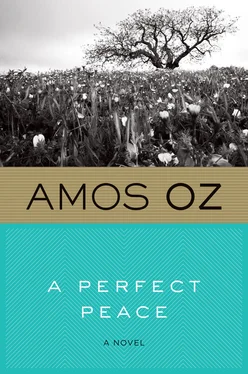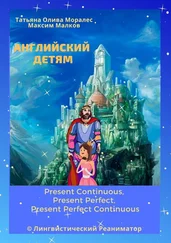"Hava," said Yolek, "you won't believe it, but I think I actually dozed off."
"Sleep all you want. I think Srulik was looking for you."
"Eh?"
"Srulik. I said Srulik was here."
"You're right," said Yolek. "Spring is really here."
"By all means," snapped Hava. And went off to make him tea.
Because of the mud, they couldn't take the short route, the one that followed the tractor path in an almost straight line through the fields, curving slightly only by the cemetery, until it reached the foot of the hill. The rain had turned it into a quagmire, forcing them to take a detour to the north along the narrow, unused, but still paved British road that looped twice around the hill before entering the ruins of Sheikh Dahr. Every winter the stiff asphalt crumbled a bit more, and a wild undergrowth of nettles, thorny burnet, and prosopis broke rapaciously through it, piercing its tarry cadaver with prickly snarls. Flood waters had caused the stone shoulders to collapse, and whole sections of the road had caved in and been swept away. Craters made by shells and mines in the '48 war gaped amid the rank foliage, marking where blood had been shed. Along a curve in the road stood the hulk of a burned-out truck, through whose empty headlight casings ferns were growing. The phrase "the wrath of God" crossed Azariah's mind.
At ten o'clock, Udi and Anat had joined Yonatan, Rimona, and Azariah, and they had all set out together for Sheikh Dahr. Udi was sure that the floods must have unearthed some of the ancient facing stones of the biblical Jewish village. He had a collection of stones like these in his garden, adding to them from time to time both for their beauty and for the feeling of vindication, or poetic justice, or biblical prophecy fulfilled, that their retrieval, or, as he preferred to call it, their "liberation," gave him. As soon as the tractor path was dry, he would hitch up a tractor and liberate whatever they might find today. "If we do find anything, that is. And if one of us happens to come across a nice old piece of Arab junk, we can take it home for a planter and grow a creeper in it."
Anat, for her part, was more interested in mushrooms. She thought the rocky slopes beneath the pine-reforested hilltops would be a good place to go looking for them.
Azariah Gitlin had volunteered to be responsible for the logistics of the party. Early that morning he took from the kibbutz kitchen some fried drumsticks left over from the Friday night meal and carefully wrapped them in plastic, not to mention potatoes, fresh vegetables, oranges, and cheese and hard-boiled-egg sandwiches. In honor of spring's arrival, he had put on his very best clothes, a striped red-and-blue shirt and a pair of smartly cuffed gabardine slacks that were a bit on the short side, baring his thin white legs above his green woolen socks and the pointy-toed, stylish, though slightly down-at-the-heel city shoes he'd worn to work on his first day in the tractor shed. After careful consideration, he had decided against bringing his guitar. "He who plays for applause, the muse in himself ignores." On his belt he had hung an army canteen borrowed from Etan R. Feeling in fine fettle, he had determined to evince from now on all the traits of sleepy superiority that he had also borrowed from Etan. No more of this sensitive, scared-adolescent stuff. Henceforth he would be the person he really was, a man who had seen much, suffered much, and learned to bear all in stoic silence. He had even adopted a new walk, whose nonchalant strides, with both thumbs tucked into his belt, had been casually picked up from Udi Shneour. He was determined to be as helpful as possible to the hiking party. If, for instance, they were to run into something unexpected or dangerous on the way, and all the others, so to speak, panicked, he wouldn't think even for a second about his own safety.
At the moment he was keeping a sharp eye on the movements of Tia, who repeatedly strayed from the road to blaze a disappearing trail through the thickets of high grass, thorn bushes, and wild oleanders, penetrating into the damp heart of the shady maquis and rustling about there for many minutes at a time as if on the spoor of some prey. She pawed up earth, chased invisible quarry, let out scared yelps that turned to wolfish howls, backed off with angry alarm, circled the field mouse, turtle, or hedgehog she had found to cut off its line of retreat, and finally, trailing feathers of fern and arrowheads of thorns, charged back to rejoin them as if newly born, only to wander off again.
"I tell you, she's on to something," said Azariah. "I tell you, she's found tracks and is trying to let us know. And we don't even have a gun."
"Take it easy," said Udi in his clipped, rough voice. "It's only a scalping party of Red Indians."
"At eight this morning I saw Bolognesi leave the kibbutz by the back gate and set off by himself in the direction of the old well," said Azariah darkly.
"Bolognesi is a good person," said Rimona. "And so are you, Azariah. And this is a good day for a hike."
"That's for sure," said Udi. "It's a damned nice day. The winter really overdid it this year."
"I don't know about that," said Rimona.
"About what?"
"About the winter already being over."
"I wish you'd stop talking about the winter," said Anat. "I'd rather hear about scalping parties."
They walked on in silence for a while until Tia bolted out of the bushes and jumped on Yonatan with her forepaws, as if to head him off or slow him down. Just then, three shots echoed softly in the distance, so muffled they might have been fired under a quilt, and a flock of birds circled high into the air, rapidly gaining altitude.
"When a blue Saturday like this comes along after weeks of wind and rain," said Rimona, "it makes you want to go right out and pick something fresh. Then at least there'll be something to remember it by if the rain starts up again. Like those olive branches up there, so dark green on one side and so pale silver on the other. Yoni's allergic to pine. It makes him cry. But who can pick them when they're still so wet? Just a touch will get you a cold shower down your neck."
Before she had a chance to finish, Azariah had bounded off the road and charged up the collapsing embankment at its side. Struggling through the mud, he advanced into a low thicket of gum trees from which, smiling modestly, he finally emerged with a bouquet of wet olive branches.
"I can pick more," he promised. "As many as you like."
"But you're drenched!" cried Rimona, the corners of her mouth smiling at him. She ran a hand over her cheek as if she were the wet one, wiped his forehead with the back of it, and took the branches with cupped palms. "Thank you," she said. "You're so kind."
"It was nothing," said Azariah, grinning.
"And there's water down your neck too. Give me a handkerchief. I'll dry it for you."
The promise of her touch and the lilt of her voice set Azariah to rummaging frantically through his pockets. He found a penknife but no handkerchief. Flustered, he couldn't find any cigarettes either. Yonatan, sensing what he was after, offered him a smoke and lit one for himself. I'll break every bone in your body, you little grasshopper, he thought, but reversed himself at once. Never mind. Tomorrow I'm taking off and leaving her behind. She'll be yours for the asking, you dumb grasshopper, because you'll be all that she'll have. And all you'll have is a stuffed kewpie doll.
"Those cigarettes you people keep smoking," said Anat, "are making you miss out on all the wonderful smells."
"Right you are," said Azariah, trying to roughen his voice. "I'm going to put mine out right now. It's too damned nice around here."
"How about that?" said Udi to Yonatan. "As soon as you get up in the morning, they're telling you what to do. No Smoking or Spitting Allowed. Oh well. Take a look at that landscape over there, Yoni. All the Arab terraces have been washed away, but that bottom course of stone still left down there must be from Second or First Temple times. Whatever Jews built, lasts. No flood can touch it."
Читать дальше












